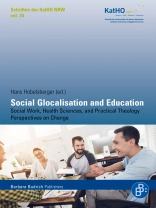This book discusses the local effects of globalisation, especially in the context of social work, health and practical theology, as well as the challenges of higher education in a troubled world. The more globalised the world becomes, the more important local identities are. The global becomes effective in the local sphere. This phenomenon, called ‘glocalisation’ since the 1990s, poses many challenges to people and to the social structures in which they operate.
สารบัญ
Hans Hobelsberger: Preface
Part I: Glocalisation
Peter K. A. Cardinal Turkson: Social glocalisation and integral humanism
Heiner Bielefeldt: Strengthening local actors: human rights work within the United Nations
1 Challenges of glocalisation in the context of social work, health sciences & practical theology
1.1 Challenges for social work, education and health care in the global migration society
Norbert Frieters-Reermann: Challenges for social work, education and health care in the global migration society: Opening Remarks
Norbert Frieters-Reermann: ‘No longer without us!’ How to support participation in the context of displacement and forced migration
Monika Nová: Migration of parents in search of work while children and adolescents are left in their home country
1.2 Human rights in social work and health sciences
Carlos I. Man Ging, Mónica Sáenz Amaguaya: What have we learned about prevention of sexual abuse in the Catholic Church?
Yoko Kato: Study on the quality of life of medically dependent disabled children requiring medical care at home and their caregiving mothers
1.3 The welfare state in the European process of integration and globalisation – social work in new regulatory structures
Monika Többe-Schukalla: The welfare state in the European process of integration and globalisation – social work in new regulatory structures: Opening Remarks
Stefan Sjöberg: Community work in the context of the Swedish welfare model in transition
Ilona Błaszczyk, Piotr Kostyło: Pro-family policy as an instrument of building the welfare state
Monika Többe-Schukalla, Harri Mäkinen, Tuija Suikkanen-Malin, Sven Trygged: When money is tight – narratives from low income families in Finland, Sweden and Germany
1.4 Inclusive social sustainability in the 2030 Agenda – promoting the participation of vulnerable groups
Sabine Schäper: Inclusive social sustainability in the 2030 Agenda – promoting the participation of vulnerable groups: Opening Remarks
Lars Wissenbach: From global goals to local action: The innovative potential of global policy frameworks for disability-inclusive local development
Yoko Okamoto, Yoko Kato, Hidemi Sasaki, Yumi Iwamoto: A study on support to autistic children with highly artistic skills and their parents through art exhibition programmes – support programme triggered by an encounter with child x
1.5 Human dignity, justice, peace – the tasks facing religions
Joachim Söder: Human dignity, justice, peace – the tasks facing religions: Opening Remarks
Svetlana Trbojevik: Fundamental values in christianity reflected in social welfare policy and social work
Hidemi Sasaki, Yumi Iwamoto, Yoko Okamoto, Shigeko Kato, Kyoko Okada, Yoko Kato: Contribution to community welfare is based on collaboration between nursing, welfare and education: starting with the deaconess training in Germany
Part II: Higher education in a glocal world
1 University education in a glocalised world
Maureen K. Porter, Maureen W. Mc Clure: Local meets global: a converging conversation
Fr. Abraham V. Mani: Social responsibility by higher education institutions – a sustainable development model by CHRIST University, Bangalore, India
Armin G. Wildfeuer: Idea and function of science and scientific knowledge in a glocalised world
2 Concrete tasks of higher education in a glocal world
2.
เกี่ยวกับผู้แต่ง
Hans Hobelsberger is professor at and president of the Catholic University of Applied Sciences
Cologne, Germany












